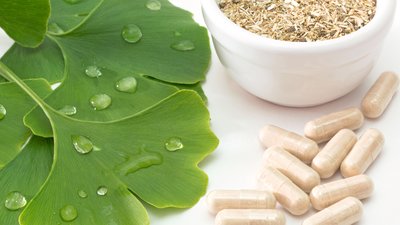What is Ginkgo Biloba?
Ginkgo biloba trees are well-known for their ability to withstand environmental stress, as well as pollutants and pests. They are the oldest tree species and are known as living fossils. It's no wonder that this nearly eternal plant has a variety of interesting uses.
Ginkgo contains more than 40 active components, the most powerful of which are found in its leaves, which can be used wholly, or made into extracts. Flavonoids and terpenoids are the antioxidants responsible for ginkgo's rejuvenating claims.
Through these antioxidants, ginkgo has the ability to support healthy circulation throughout the body, leading to a plethora of benefits including promoting cognition and mood.[1]
Can Gingko Biloba Support Cognition, Mood, and Memory?
Although ginkgo is most popularly used as a memory and cognition supporter, there is still debate concerning its efficacy. Studies with the same dosage of 120 milligrams of ginkgo biloba extract have had conflicting outcomes where memory is concerned.[2, 3]
The positive results show that ginkgo is best used for memory recall and short-term memory tasks.[4] This was further confirmed in a study from 2001 in the journal of Physiology and Behavior. It found that ginkgo not only supported memory after a single dose, but also promoted self-rated mood.[5]

This means ginkgo may be used to fight the Monday morning blues, and simultaneously maintain concentration at work with just one dose.
For now, the most promising recommendation for ginkgo's use is for supporting short-term memory.
Does Gingko Biloba Reduce Premenstrual Syndrome Symptoms?
Approximately 70-90 percent of females of reproductive age suffer from physical, behavioral, or psychological symptoms of PMS every month, and around 10 percent of those cases are considered severe.[6]
Ginkgo biloba may lessen symptoms of your monthly battle with Mother Nature by supporting mood and psychological symptoms. Two separate studies have found improvements in PMS symptoms, including mood-dependent behavior, as a result of ginkgo supplementation.[7]
What Are the Available Forms of Ginkgo Biloba?
Gingko can be enjoyed many ways. The most popular is through an extract in a capsule or liquid form, although teas and other beverages are available.
Look for an extract that contains flavonoids and terpenoids on the label, or contains the standardized leaf extract sometimes referred to as GBE (ginkgo biloba extract).

What's The Proper Dosage of Ginkgo Biloba?
Ginkgo is a dose-dependent herb, meaning an increased intake may result in a more robust response.
But don't use that as a license to down an entire bottle. Gingko is best taken as an extract in daily doses of 120-240 milligrams. This amount can be taken at once or divided into three daily doses.
Does Gingko Biloba Have Any Side Effects or Other Interactions?
Ginkgo is considered generally safe and has few side effects, although it can interact with anticoagulants and antiplatelet medications. If you are taking other medications, ask your doctor before starting a new herbal supplement routine.
References
- Van Beek, T. A. (2002). Chemical analysis of Ginkgo biloba leaves and extracts. Journal of Chromatography A, 967(1), 21-55.
- DeKosky, S. T., Williamson, J. D., Fitzpatrick, A. L., Kronmal, R. A., Ives, D. G., Saxton, J. A., ... & Kuller, L. H. (2008). Ginkgo biloba for prevention of dementia: a randomized controlled trial. Jama, 300(19), 2253-2262.
- Snitz, B. E., O’meara, E. S., Carlson, M. C., Arnold, A. M., Ives, D. G., Rapp, S. R., ... & DeKosky, S. T. (2009). Ginkgo biloba for preventing cognitive decline in older adults: a randomized trial. Jama, 302(24), 2663-2670.
- Rigney, U., Kimber, S., & Hindmarch, I. (1999). The effects of acute doses of standardized Ginkgo biloba extract on memory and psychomotor performance in volunteers. Phytotherapy research, 13(5), 408-415.
- Kennedy, D. O., Scholey, A. B., & Wesnes, K. A. (2002). Modulation of cognition and mood following administration of single doses of Ginkgo biloba, ginseng, and a ginkgo/ginseng combination to healthy young adults. Physiology & Behavior, 75(5), 739-751.
- Tamborini, A., & Taurelle, R. (1993). Value of standardized Ginkgo biloba extract (EGb 761) in the management of congestive symptoms of premenstrual syndrome. Revue Francaise de Gynecologie et D'obstetrique, 88(7-9), 447-457.
- Ozgoli, G., Selselei, E.A., Mojab, F., Majd, H.A., A Randomized, Placebo-Controlled Trial of Ginkgo biloba L. in Treatment of Premenstrual Syndrome. The Journal of Alternative and Complimentary Medicine, 2009. 15(8).
- Wu, Y., Li, S., Cui, W., Zu, X., Du, J., & Wang, F. (2008). Ginkgo biloba extract improves coronary blood flow in healthy elderly adults: role of endothelium-dependent vasodilation. Phytomedicine, 15(3), 164-169.

